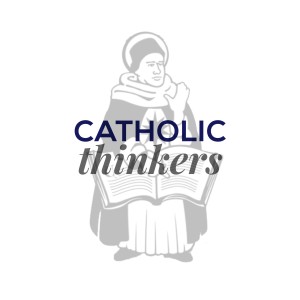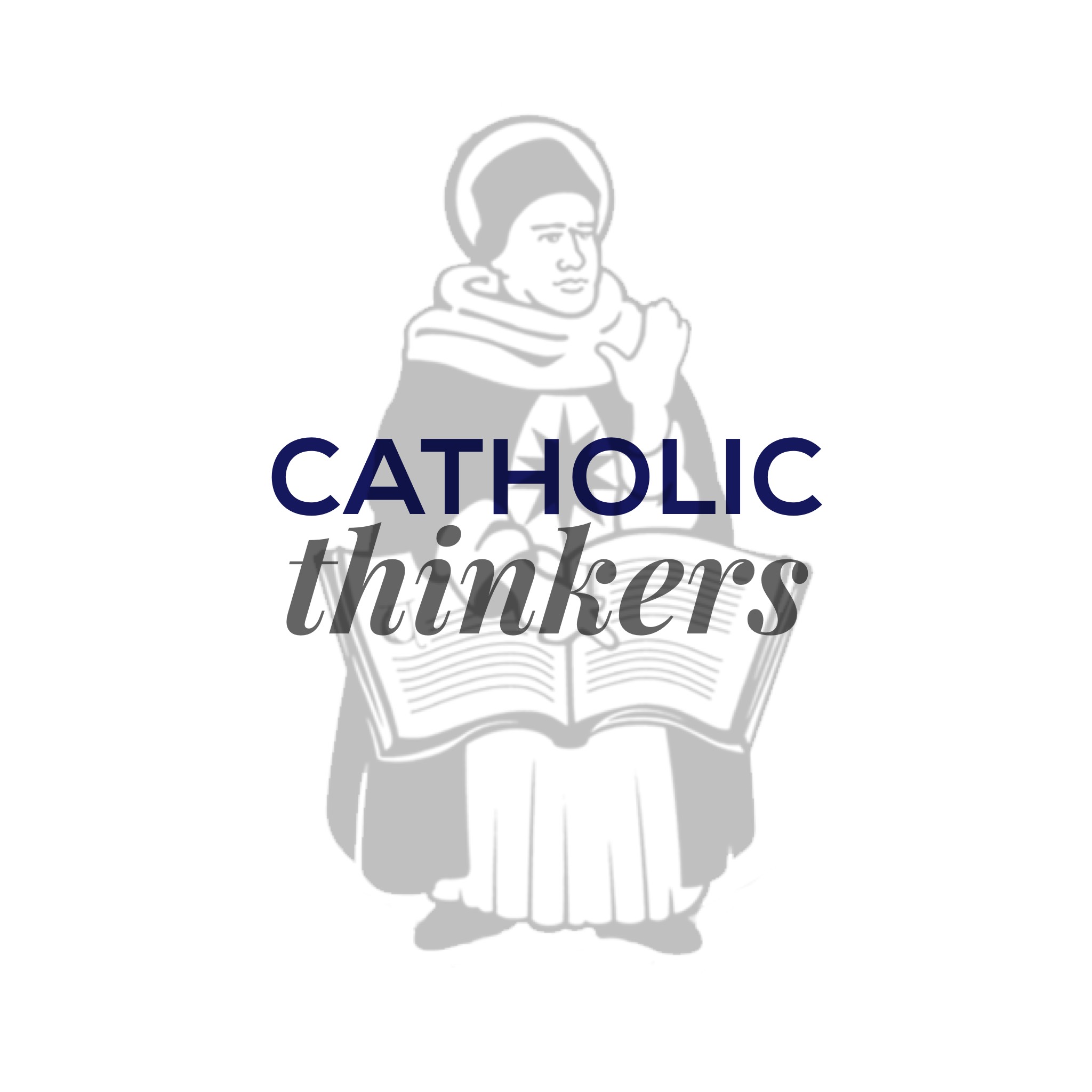Episodes

Friday Oct 15, 2021
Friday Oct 15, 2021
Recorded in 2003. This course is designed to introduce the student to principles, sources, resources, matter, and scope of theology within the Catholic tradition. The primary concern in this course is to establish the "foundation" for doing theology by providing the student with an understanding of the norms of Catholic doctrine and theology: sacred scripture, Tradition, and Magisterium.
catholicthinkers.org

Friday Oct 15, 2021
Friday Oct 15, 2021
Recorded in 2003. This course is designed to introduce the student to principles, sources, resources, matter, and scope of theology within the Catholic tradition. The primary concern in this course is to establish the "foundation" for doing theology by providing the student with an understanding of the norms of Catholic doctrine and theology: sacred scripture, Tradition, and Magisterium.
catholicthinkers.org

Thursday Oct 14, 2021
Norms of Catholic Doctrine by Marcellino D‘Ambrosio 2: Revelation
Thursday Oct 14, 2021
Thursday Oct 14, 2021
Recorded in 2003. This course is designed to introduce the student to principles, sources, resources, matter, and scope of theology within the Catholic tradition. The primary concern in this course is to establish the "foundation" for doing theology by providing the student with an understanding of the norms of Catholic doctrine and theology: sacred scripture, Tradition, and Magisterium.
catholicthinkers.org

Wednesday Oct 13, 2021
Norms of Catholic Doctrine by Marcellino D‘Ambrosio: 1. Fundamental Theology
Wednesday Oct 13, 2021
Wednesday Oct 13, 2021
Recorded in 2003. This course is designed to introduce the student to principles, sources, resources, matter, and scope of theology within the Catholic tradition. The primary concern in this course is to establish the "foundation" for doing theology by providing the student with an understanding of the norms of Catholic doctrine and theology: sacred scripture, Tradition, and Magisterium.
catholicthinkers.org

Friday Oct 01, 2021
An Essay by Fr. Schall: 19. Why Priests Need Philosophy
Friday Oct 01, 2021
Friday Oct 01, 2021
Catholicism has a wholeness about it that does not see reason as somehow contrary to either Scripture or human experience. This essay brings up the peculiar nature of specifically Christian revelation and its relation to the philosophic tradition.

Friday Oct 01, 2021
An Essay by Fr. Schall: 18. What is Theology?
Friday Oct 01, 2021
Friday Oct 01, 2021
What Is Theology? is a fairly short discussion which seeks to clarify the relationship between political philosophy and revelation. This essay originally appeared in “First Principles,” an on-line journal of the Intercollegiate Studies Institute.

Thursday Sep 30, 2021
An Essay by Fr. Schall: 17. What and Where is Catholicism
Thursday Sep 30, 2021
Thursday Sep 30, 2021
What and Where is Catholicism is a talk that was originally given at a parish in Cockeysville, Maryland. It surveys the geographical extent of Catholicism but concentrates on the fact that the center of Catholicism is where the Mass is.

Thursday Sep 30, 2021
An Essay by Fr. Schall: 16. Thomas Aquinas and the Life of the Mind
Thursday Sep 30, 2021
Thursday Sep 30, 2021
The life of the mind is thinking. We even speak of thought as the highest expression of thought, which in turn refers to thinking the reality that is. Aquinas remains the model of many who see that the first order of the world is the order of mind that reflects that world that exists.

Tuesday Aug 31, 2021
On Veritatis Splendor by Joseph Koterski, S.J.: 2. Structure of the Encyclical
Tuesday Aug 31, 2021
Tuesday Aug 31, 2021
This lecture reviews the structure of the encyclical Veritatis splendor as a whole. It begins with a chapter on the story of Christ’s encounter with the rich young man and explains how Catholic moral theology uses faith and revelation. The second chapter identifies and analyzes four erroneous trends in contemporary moral theology. The final chapter exhorts readers to put the insights of sound moral theology into practice, especially in the new evangelization and the cultivation of holiness.
Course Description
This series of lectures examines the context and content of Veritatis splendor, the encyclical by Saint John Paul II on fundamental moral theology. As is typical of the Catholic approach, Veritatis splendor attempts to integrate faith and reason by using both revelation and philosophical argumentation to answer the important questions of morality.
Accordingly, this lecture series examines the pope's use of the story of Christ's encounter with the rich young man to discuss some of the basic concepts of moral theology, and to honor Vatican II's call for moral theologians to use the Scriptures pervasively and not just to cite biblical passages out of context for the confirmation of ethical positions arrived at by other means.
This series also reviews the insights of John Paul II about four major areas of concern: freedom and law, conscience and truth, the proper way to provide a moral analysis of a deliberate human act, and the role of teleology in moral matters. These lectures call attention to the distinctions that Veritatis splendor makes between authentic and inauthentic notions of freedom, conscience, the moral object, and teleology.
Finally, these lectures consider the pastoral dimensions of Veritatis splendor. In particular it examines Pope John Paul II's reflections on holiness and martyrdom, in the service of the truths about morality. Throughout this series of lectures, there is an effort to define important terms, to show the patterns of the pope's arguments, and to bring out the significance of the encyclical's reflections for understanding the distinctively Catholic position in moral theology.
https://youtube.com/playlist?list=PL6cPgDv4oMrtr_AZh2mzjxwWnq-5UKqEc
catholicthinkers.org

Monday Aug 30, 2021
On Veritatis Splendor by Joseph Koterski, S.J.: 1. Introduction
Monday Aug 30, 2021
Monday Aug 30, 2021
The opening lecture places the encyclical Veritatis splendor in the context of Pope John Paul II’s many accomplishments. It is an encyclical on fundamental moral theology, designed (1) to exemplify a reliable way in which to use scripture for moral theology, (2) to correct four erroneous tendencies frequent in contemporary works of moral theology, and (3) to show the biblical and philosophical roots of such important concepts as human dignity.
Course Description
This series of lectures examines the context and content of Veritatis splendor, the encyclical by Saint John Paul II on fundamental moral theology. As is typical of the Catholic approach, Veritatis splendor attempts to integrate faith and reason by using both revelation and philosophical argumentation to answer the important questions of morality.
Accordingly, this lecture series examines the pope's use of the story of Christ's encounter with the rich young man to discuss some of the basic concepts of moral theology, and to honor Vatican II's call for moral theologians to use the Scriptures pervasively and not just to cite biblical passages out of context for the confirmation of ethical positions arrived at by other means.
This series also reviews the insights of John Paul II about four major areas of concern: freedom and law, conscience and truth, the proper way to provide a moral analysis of a deliberate human act, and the role of teleology in moral matters. These lectures call attention to the distinctions that Veritatis splendor makes between authentic and inauthentic notions of freedom, conscience, the moral object, and teleology.
Finally, these lectures consider the pastoral dimensions of Veritatis splendor. In particular it examines Pope John Paul II's reflections on holiness and martyrdom, in the service of the truths about morality. Throughout this series of lectures, there is an effort to define important terms, to show the patterns of the pope's arguments, and to bring out the significance of the encyclical's reflections for understanding the distinctively Catholic position in moral theology.
https://youtube.com/playlist?list=PL6cPgDv4oMrtr_AZh2mzjxwWnq-5UKqEc
catholicthinkers.org

